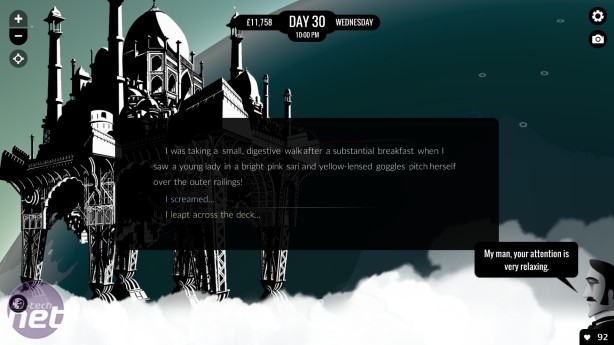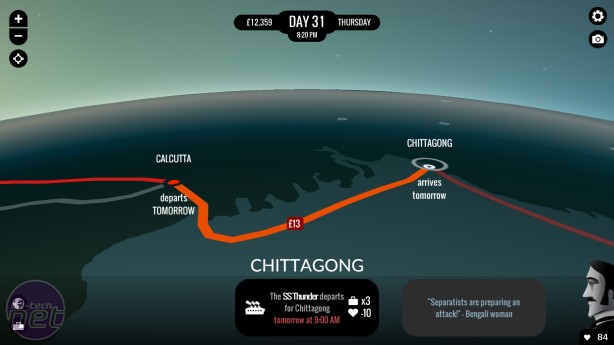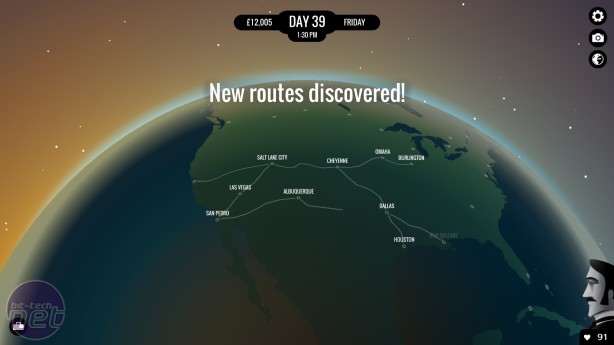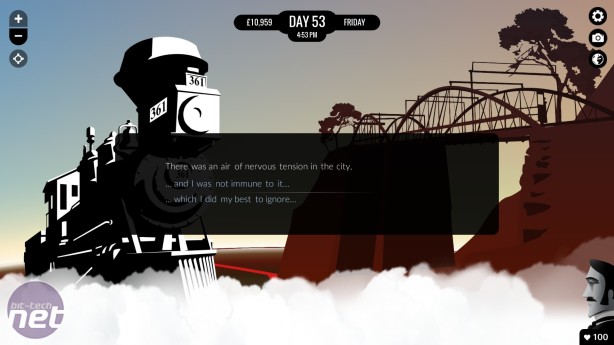
All told, it's an ingenious way to structure an interactive fiction game. The world and its many cities make all the available narrative branches clearly visible, but without revealing the events themselves. What's more, the time limit as dictated by the wager means you always have an ultimate goal in mind, while the systems like the luggage and the AI operated transport means that the world feels dynamic and that the story unfolds as much from accidents and mistakes as it does from player choice. Often I was glad to have missed a train as I later stumbled on an engrossing story fragment in that particularly city.
These components are what make 80 Days a novel and intriguing interactive fiction, but what makes it special is the quality of the writing and the range of adventures on offer. The game captures the Victorian prose style brilliantly, yet is easily readable by a modern audience. Locations are described in concise yet remarkably vivid paragraphs that appeal to different senses, taking in sounds and smells
Phileas Fogg is the epitome of the Victorian Gentleman - stoic and effortlessly polite on the surface, but betraying hints of emotion here and there. Passepartout's character is much more malleable. You can roleplay him with similar mannerisms to his master, lend him a more excitable and hot-tempered air, or simply respond as the situation dictates.
And these situations range enormously. Each city has various adventures and encounters attached to it, and each travel route can give rise to surprising eventualities. In one instance, Passepartout was gifted a dagger by a merchant in Baghdad. Later revealed to be cursed, the dagger would return to Passepartout every time he attempted to rid himself of it. A week or so later, the pair traveled to Manila via a vessel named Red Market, whose heavily pregnant captain gave birth mid-voyage, the baby delivered by Fogg and Passepartout together.
80 Days flings choices at you constantly; how to respond in a conversation, whether to appeal to Fogg for action or do so on your own initiative. Some of these options influence Passepartout's character while others impact upon his relationship with Fogg. These changes cause a pulse of excitement when the game reveals them, but it's difficult to ascertain how they affect the overall course of the game.
There are a few other issues worth discussing. While the PC version of the game is a fine port, there are instances where its mobile roots are obvious, such as having to "scroll" through luggage using the mouse, which feels counterintuitive. Also, while the emphasis on storytelling means 80 Days works as a game to sit down and dedicate a "session" to, it is nevertheless best played in short bursts.
The adventure itself may prove an acquired taste as well. The emphasis is generally more on light-hearted experiences and conversations, rather than pulse-pounding action and peril. There are moments where danger rears its head, such an unexpected automobile accident, or being framed for a murder, but mostly 80 Days is about exploring places and meeting people from a wide variety of cultures, listening to the opinions they hold and the stories they have to tell.
Regardless of whether the narrative style is your cup of tea or not, 80 Days is still a mightily impressive achievement. Its intricate blend of a heavy narrative focus with a light sprinkling of interlocking mechanics is uniquely compelling, and that it manages to stir such powerful feelings of adventure using just a few lines of text and a few lines on a globe is truly remarkable.
These components are what make 80 Days a novel and intriguing interactive fiction, but what makes it special is the quality of the writing and the range of adventures on offer. The game captures the Victorian prose style brilliantly, yet is easily readable by a modern audience. Locations are described in concise yet remarkably vivid paragraphs that appeal to different senses, taking in sounds and smells
Phileas Fogg is the epitome of the Victorian Gentleman - stoic and effortlessly polite on the surface, but betraying hints of emotion here and there. Passepartout's character is much more malleable. You can roleplay him with similar mannerisms to his master, lend him a more excitable and hot-tempered air, or simply respond as the situation dictates.
And these situations range enormously. Each city has various adventures and encounters attached to it, and each travel route can give rise to surprising eventualities. In one instance, Passepartout was gifted a dagger by a merchant in Baghdad. Later revealed to be cursed, the dagger would return to Passepartout every time he attempted to rid himself of it. A week or so later, the pair traveled to Manila via a vessel named Red Market, whose heavily pregnant captain gave birth mid-voyage, the baby delivered by Fogg and Passepartout together.
80 Days flings choices at you constantly; how to respond in a conversation, whether to appeal to Fogg for action or do so on your own initiative. Some of these options influence Passepartout's character while others impact upon his relationship with Fogg. These changes cause a pulse of excitement when the game reveals them, but it's difficult to ascertain how they affect the overall course of the game.
There are a few other issues worth discussing. While the PC version of the game is a fine port, there are instances where its mobile roots are obvious, such as having to "scroll" through luggage using the mouse, which feels counterintuitive. Also, while the emphasis on storytelling means 80 Days works as a game to sit down and dedicate a "session" to, it is nevertheless best played in short bursts.
The adventure itself may prove an acquired taste as well. The emphasis is generally more on light-hearted experiences and conversations, rather than pulse-pounding action and peril. There are moments where danger rears its head, such an unexpected automobile accident, or being framed for a murder, but mostly 80 Days is about exploring places and meeting people from a wide variety of cultures, listening to the opinions they hold and the stories they have to tell.
Regardless of whether the narrative style is your cup of tea or not, 80 Days is still a mightily impressive achievement. Its intricate blend of a heavy narrative focus with a light sprinkling of interlocking mechanics is uniquely compelling, and that it manages to stir such powerful feelings of adventure using just a few lines of text and a few lines on a globe is truly remarkable.
-
Overall88 / 100


MSI MPG Velox 100R Chassis Review
October 14 2021 | 15:04













Want to comment? Please log in.